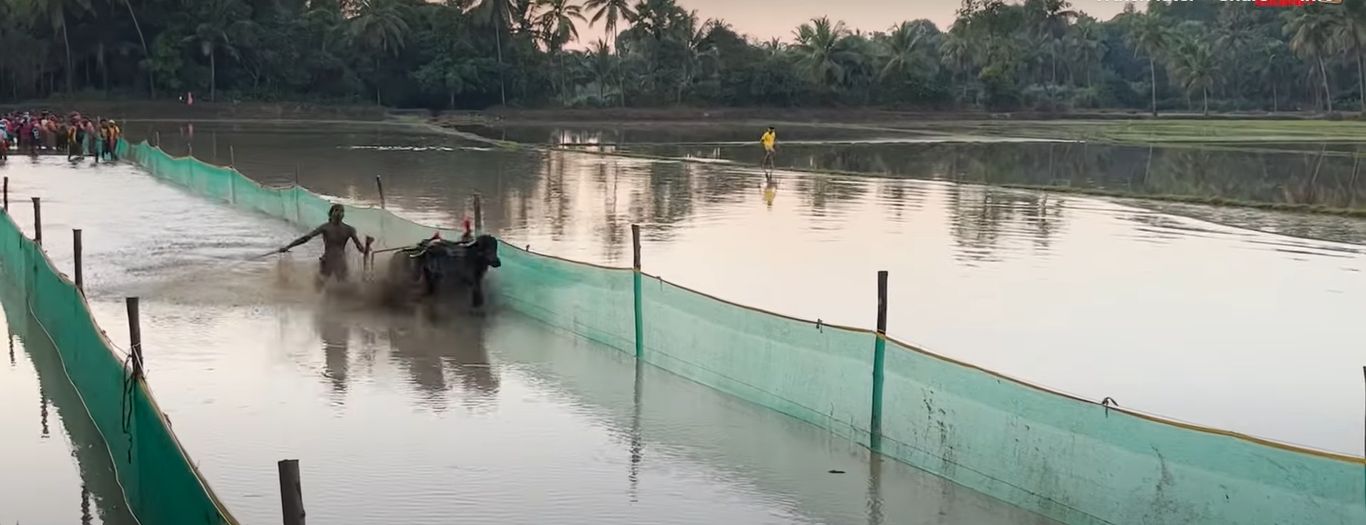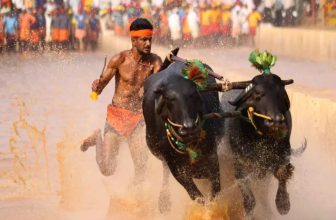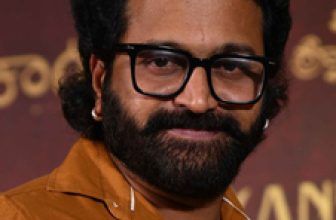
Kambala is a traditional sport with roots in ancient India, and it’s still thriving today. The Kambala festival is an annual cultural event celebrated in coastal India. It involves two teams of buffalo pullers racing against each other on a track, to be the fastest to complete the course. This traditional buffalo race has been ritualistically performed for centuries and remains a popular event today. With its unique cultural significance, vibrant experiences, and exciting events, the Kambala festival continues to be one of India’s most captivating celebrations!
The Origin of Kambala and Its Ancient Significance:
Kambala Festival dates back centuries to the ritual ploughing of farms in South India for the preparation of agricultural land. Before sowing, believed to be a propitiation of the earth goddess and an invocation of divine blessings. Even today, locals in coastal Karnataka still observe Kambala as part of that process. It has remained popular through the ages due to its festive atmosphere. And its focus on teamwork, with two pairs of farmers often competing against each other.
How the Tradition Has Evolved Through History:
Despite being rooted in ancient practices, Kambala has evolved significantly through the ages. This was once a ritual ploughing of fields. And has now become an elaborate sport involving large teams of trained buffalo and competitive structures. The addition of large crowds, prize money pools, and modern technology for timing and scoring has helped keep the tradition alive in the modern age. It remains popular today as one of India’s oldest surviving sports traditions.
The Kambala festival has undergone numerous changes over time. In modern-day races, the buffaloes are decorated with bright ornaments and ridden by the people taking part in the event. Along with this, there have been many rule changes and new regulations implemented over the years to ensure a safe and enjoyable experience for everyone involved.
Importance of Kambala:
Kambala is an important part of Indian culture. As it reflects a respect for the power of nature, by celebrating the strength and agility of two buffalo pulling a plough. It has also become an important part of social life in rural India – both as a competitive sport and as a way to bring people together. It has even been used to bridge longstanding differences between communities, with different villages coming together to host races or competitions.
The Rules and Regulations Governing the Race:
Kambala races are governed by several rules and regulations that help ensure the safety of both participants and spectators. The most important rules include keeping to set tracks that use a combination of mud, sand, and water; maintaining designated start and finish lines; setting standard training duration for the animals; and setting the prize money for winners. These rules all help contribute to fair competition in line with tradition, making this races exciting entertainment for everyone involved.
A Look at Some of Today’s Popular Kambala Championships:
The most popular of the Kambala championships today is the “Mangalore Kambala” in Kadri, Karnataka. It known as the “Popular Kambala” or “Greatest Race”. This tournament sees more than 150 pairs of buffalos each competing against the other throughout a three day event full of races, fun activities and fantastic prizes. Other popular Kambala tournaments include Kadri Kambala, Vandaru , Jodukere, Billadi, Baradi beedu, Aikala etc. All of these events draw large crowds and provide memorable entertainment for audiences all over India.
There are many players ran 100 meters race in less than 10 seconds. Mainly Vishwanath devadiga who completed 100 meter race in 9.15 seconds. And Srinivas gowda, who completed the race in 9.55 seconds.
We got an opportunity to meet Vishwanath devadiga, who is the fastest runner in Kambala. Watch the full video to know more about him.
Also read about – Agumbe Ghat – Hidden A Gem of India
Also read – 100 years old Garadi Mane in Bangalore







